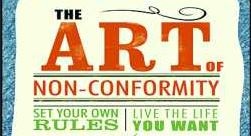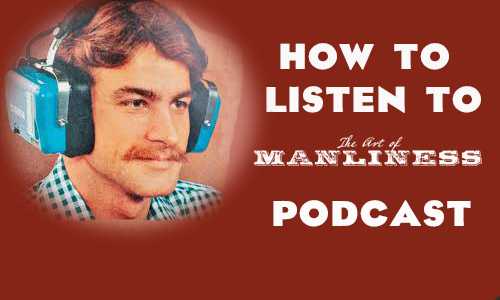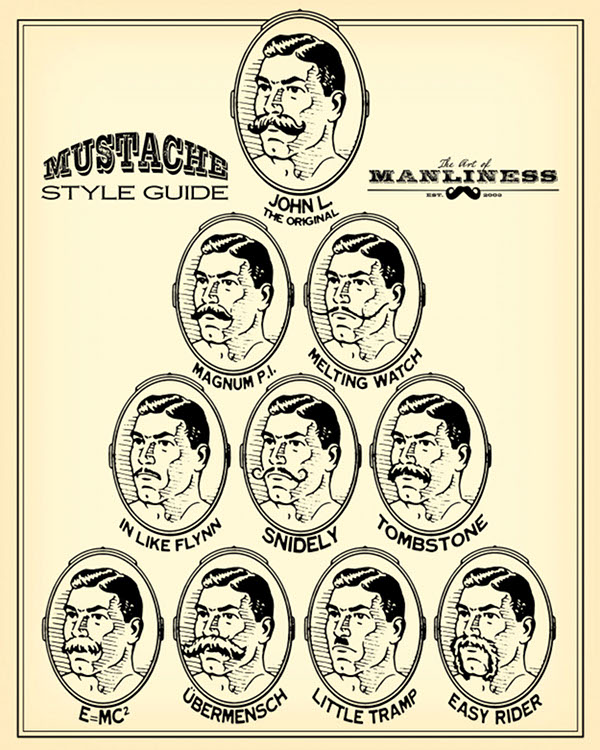Since starting the Art of Manliness, I’ve read a boatload of the best books for men. There are books out there on every aspect of the male experience from practical skills like carving a turkey and dressing well to sociological studies on what it means to be a man in history and modern society to more poetic examinations of the male experience. If you’re a fan of the Art of Manliness, then you’re probably interested in all of these different elements of being a man, so today I’d like to share a list of books that I’ve found useful and thought-provoking in my own life and journey in trying to understand what it means to be a man. Many of them can be a mixed bag both in terms of quality and content that jives with my own beliefs. But you’ll never grow as a man only reading things that flatter your pre-existing notions! So if you’re a man who’s looking to learn more about both the fun and serious sides of manliness, I hope this list can be a resource for books to pick up, study, and enjoy.
The Inner Man and Improving Relationships
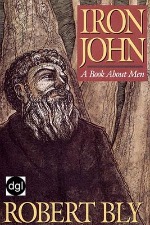
Iron John: A Book About Men
The book that launched a thousand naked drumming circles. Iron John kick-started the mythopoetic men’s movement and inspired many of the people doing men’s only counseling and retreats. Poet Robert Bly uses an old Grimm’s fairytale to explain a man’s growth into the mature masculine.
You’re not going to find a lot of practical tips on improving yourself as a man, but Iron John certainly gives you a lot to think about. It’s a book you really need to read a couple times and meditate on.
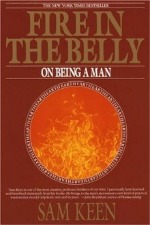
Fire in the Belly: On Being a Man
Keen argues that men today need to rekindle their “fire in the belly” or what the ancient Greeks called thumos. It’s that manly spiritedness that drives men to do great deeds. I really like some of the questions Keen suggests using for personal evaluation as a man. Keen does argue that we need to redefine what it means to be a man and his idea of manliness is pretty granola, eco-conscience, feminist, etc. He also advocates the noble savage myth popular with many New Age gurus, arguing that we need to emulate our peaceful, goddess worshiping ancestors and give up our modern, violent ways. If that sort thing makes your blood boil, then this probably isn’t the book for you. But if it only mildly annoys you, then read it. There are some bits and pieces of insight that any man from any worldview can use.
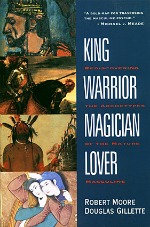
King, Warrior, Magician, Lover: Rediscovering the Archetypes of the Mature Masculine
Written by Jungian pyschologist Robert Moore and mythologist Douglas Gillette, King, Warrior, Magician, Lover looks at male development through the lens of Jungian archetypes. According to Moore, masculinity is made up of four archetypal male energies which serve different purposes. The authors argue that to become a complete man, a man must work to develop all four energies.
Moore describes the characteristics of the four archetypes and provides suggestions on how to develop them through meditation and ritual rites of passage. KWML has inspired many of the men’s groups existing today. Personally, I thought the very heavy Jungian-laden rhetoric made the book a bit of a slog to get through. I like Jung, but the way Moore presented it made it hard to get your mind around.
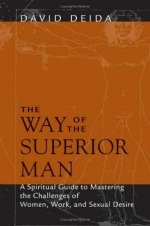
The Way of the Superior Man: A Spiritual Guide to Mastering the Challenges of Women, Work, and Sexual Desire
I had several AoM readers suggest this book to me, so I bought it and read it. David Deida concentrates on what he sees as the different polarities of men and women, and the way these polarities create attraction. There are a few interesting insights on becoming a man, but overall I found the book filled with pop-psychology fluff. The author is pretty popular in New Age/pick-up artist circles. While many see him as a spiritual guru for men, he’s admitted that he considers himself more of an entertainer than a teacher. Don’t know if I’d trust a guy with my spiritual development who thinks he’s just a jester.
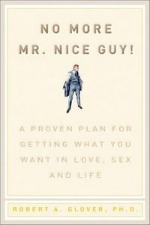
No More Mr. Nice Guy!
Do your women friends tell you you’d be a great catch, yet you’re always dateless on Friday night? Do you feel like a doormat in your marriage and at work? According to Dr. Robert Glover, you have “Nice Guy Syndrome.” In this book, Dr. Glover explains why men with Nice Guy Syndrome have proliferated in the West during the past 30 years. Even better, he lays out specific, concrete things a man can do to get over his Nice Guy Syndrome.
I thought this was a great book for guys who feel like they’re getting pushed around in life. Many AoM readers have emailed me to say how much this book has helped them. But if things are going pretty well for you in life, then the book probably won’t do too much for you.
Listen to my podcast interview with Dr. Glover.
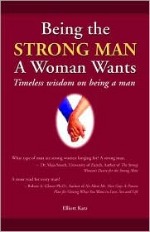
Being the Strong Man a Woman Wants: Timeless Wisdom on Being a Man
This is a quick read packed with some good insights on being a strong man for the woman in your life. The book is actually a story about a young man who’s recently married and is having marital problems. He visits Grandpa for a day hike and along the way he gets some sage advice on how to be a leader in a family.
I thought this book was okay. The authors choice of using a story to convey advice was creative, but it came off a little cheesy. I had to look past the schmaltz in order to take anything away from the book.
Listen to my podcast interview with the author, Elliot Katz.
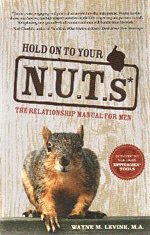
Hold on to Your NUTs: The Relationship Manual for Men
Men’s counselor and founder of BetterMen, Wayne Levine, helps men improve their relationships and become the men they want to be. In Hold on to Your NUTs (NUTs=Non-negotiable, unalterable, terms) Wayne gives men the tools they need to become confident and self-assured. What I particularly like about this book is how practical it is. Wayne has written posts for AoM before, and the comments are always very divided; some people like his kick-in-the-pants, no nonsense approach and some chafe at his tone. Personally, I’m a fan. Wayne’s not much for hand-holding and sitting around talking about your problems, but instead advocates taking action to improve your situation. You’ll find that same approach in this book. I also appreciate the fact that the book is useful for men who are in different places in life. So many of the relationship/inner man books are written for men who have big time problems. Even if you’re a well-adjusted adult man, you’ll find something useful in Hold on to Your NUTs.
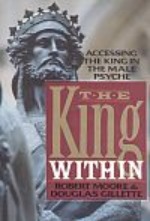
The King Within: Accessing the King in the Male Psyche
The Lover Within: Accessing the Lover in the Male Psyche
The Magician Within: Accessing the Shaman in the Male Psyche
The Warrior Within: Accessing the Knight in the Male Psyche
These four books are an expansion on the ideas found in King, Warrior, Magian, Lover. Each book goes into more depth about each archetype. If you’re a fan of Jungian psychology and enjoyed KWML, I definitely recommend these books. The books are pretty rare and can be expensive on Amazon.com, but I found copies for $5 a pop at my local used bookstore.
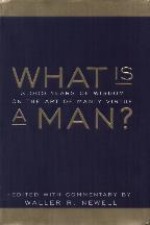
What Is a Man? 3,000 Years of Wisdom on the Art of Manly Virtue
Philosophy and political science professor Waller Newell combed through the annals of Western thought to find literature on the subject of manhood. The book is broken up into sections like “The Chivalrous Man,” “The Gentleman,” and “The Statesman.” Within each section you’ll find excerpts from the likes of Shakespeare, Homer, and Locke on what it means to be a man. The result is a 560 page behemoth of an anthology.
I really like the idea behind What is a Man? Newell’s vision of encouraging manly virtue is right in line with what we’re doing here at the Art of Manliness. When I read the fantastic introduction in What is Man? I had great expectations for the book. But I quickly found myself disappointed. First, many of the selections really don’t have anything to do with manliness or even about the virtue the selection was supposed to highlight. Also, most of the selections weren’t very stirring. My other criticism is that Newell could have done a better job editing his selections. Several of the selections go on and on and are pretty dense. Consequently, the main point that he’s trying to convey from the selection gets lost. It’s a book that ends up sitting on the shelf instead of being read.
Our upcoming book, Manvotionals: Timeless Wisdom and Advice on Living the Seven Manly Virtues, is in some ways a response to What Is a Man? I tried to make up for the deficiencies I found in What is a Man? by selecting excerpts that were on point, packed with wisdom, and readable. The result is an anthology that’s inspiring, educational, and enjoyable to read. Can’t wait to share the book with you.
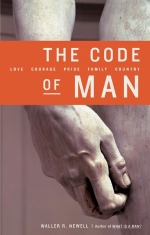
The Code of Man: Love, Courage, Pride, Family, Country
The Code of Man is Waller Newell’s follow-up to his first book What is a Man? In The Code of Man Newell argues that modern men have lost touch with values and virtues that have defined manliness for thousands of years. Consequently, many men (particularly young men) are lost, confused, and angry. Newell believes that the road to recovery is taken along the five paths to manliness: love, courage, pride, family, and country. Using Western writers and thinkers like Aristotle and Hemingway, among others, Newell attempts to guide men down the path to achieving a “manly heart.”
I really enjoyed The Code of Man, and I thought it was a much better book than What Is a Man?. The great introduction makes checking out the book worthwhile in and of itself. Newell’s idea of honorable and virtuous manliness is much more clear in The Code of Man than in What Is a Man? I think if you enjoy the idea of manliness that we espouse on AoM, then you’ll enjoy this book.
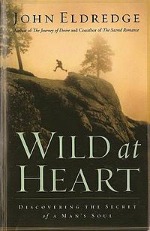
Wild at Heart: Discovering the Secret of a Man’s Soul
The best way to describe this bestselling book is that it’s the Christian version of Iron John. John Eldredge, leader of Ransomed Heart Ministries, criticizes how many modern Christian churches have made Christian men soft and wimpy. Wild at Heart is a call to Christian men to get in touch with their Wild Man. Eldredge uses Biblical figures like Jesus and John the Baptist as archetypal Wild Men that Christian men should emulate. He also uses the story of Adam and Eve as way to explore masculine development, much like Bly did with the Iron John myth in his book.
This is a favorite book among AoM readers. I can’t count the number of times readers have recommended this book to me. Overall, I thought it was a decent book that offered solid food for thought, but it doesn’t top my personal list of favorites. If you’re a Christian man who feels like there is a “wound” in your soul, this book will likely really resonate with you (although some Christians criticize the book because Eldredge’s theology does not align with their own). If you’re looking for practical advice and/or are not a theist, it won’t likely hit the sweet spot.
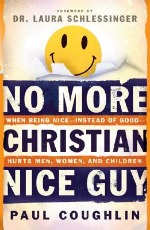
No More Christian Nice Guy: When Being Nice–Instead of Good–Hurts Men, Women And Children
This is another book written by a Christian minister who focuses his ministry on men. Like Eldredge, Paul Coughlin laments the passivity and wussiness of Christian men. He also criticizes how modern Christianity has effemenized Christ into a character who pats children on the head and spends his days petting lambs.
Coughlin sort of picks up where Eldredge left off. While Eldredge does a good job explaining the spiritual angst of Christian men, Coughlin gives a concrete roadmap on how to improve things.
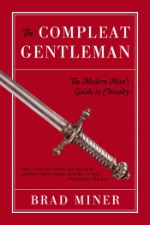
The Compleat Gentleman: The Modern Man’s Guide to Chivalry
In the Compleat Gentleman, author Brad Miner gives a thorough history of the idea of chivalry in the West. You’ll learn about the Arthurian legend that immortalized chivalry and about a sixteenth-century writer, Baldassare Castiglione, who advised Roman Emperors on the art of sprezzatura. Miner then goes on to set out three roles every man should seek to embody in order to be a “compleat” gentleman – warrior, lover, and monk, and explains how a modern man can fulfill these roles.
I really enjoyed Miner’s practical advice on becoming a gentleman and his section on sprezzatura. The section giving the history of a gentleman was sort of tedious and I had to sarge through it. I like history, I just didn’t like how it was presented in this book, but others have said they really enjoyed the history part. Like all things, it comes down to taste. He also sprinkles in some conservative political viewpoints, which can be a bit distracting for some.
Cultural and Sociological Studies of Manliness and Masculinity
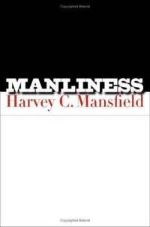
Manliness
Harvard professor Harvey Mansfield created quite a stir among academics with this book, which criticizes our gender-neutral society and defends manliness as a virtue. Mansfield uses literature, history, and science to define manliness as the ability to take on risks with confidence and gusto.
Mansfield makes some insightful points, but those points are few and far between. The book is poorly organized and written. Mansfield jumps all over the place, and his arguments can be hard to follow at times. In fact, for this very reason I stopped reading the book halfway through the first time I picked it up. I gave it another chance a few months later, and I had to force myself to finish it. There are whole chapters where it seems like he just jumbled a bunch of quotes from Nietzsche and Darwin together, put in the word “manliness,” and called it a day.
I had high hopes for Manliness, but it just fell flat for me.
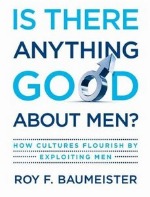
Is There Anything Good About Men? How Cultures Flourish by Exploiting Men
Pyschologist Roy Baumeister flips the feminist argument that women have been oppressed and exploited on its head and argues that it’s actually the other way around: men are the ones that society exploits. Baumeister argues that throughout history men have been seen as more expendable than women; they’re ones who went to war, took the dirty jobs, and sacrificed their lives.
Baumeister uses studies from the growing fields of evolutionary psychology and sociobiology to explain why cultures have exploited men the way they have. Baumeister argues that much of male and female behavior is hardwired and that these differences should be used to complement each other instead of as fodder for the gender war.
The book is a really interesting read, but honestly, the article he wrote that became the book sums up his main points much more succinctly.
Listen to my interview with Dr. Baumeister.
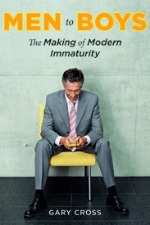
Men to Boys: The Making of Modern Immaturity
Why does it seem many men these days are just a bunch of boys walking around in men’s bodies? While many people think the “man boy” is a recent cultural phenomenon, history professor Gary Cross argues that modern male immaturity has been in the making for nearly 100 years in the United States. Cross explores the cultural and economic factors that have contributed to men shirking responsibility and indulging in pastimes and consumer products commonly associated with teenagers.
Listen to my podcast with Dr. Cross.
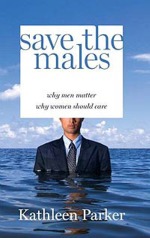
Save the Males: Why Men Matter, Why Women Should Care
Save the Males is a book written by female writer, Kathleen Parker, who criticizes the feminist movement for creating the male-bashing culture that’s taken root in America during the past 30 years. She then goes on to argue how the anti-male rhetoric has been bad for both men and women.
Parker raises some interesting points, and it’s refreshing to see a female writer actually defend men from feminist attacks, but overall I wasn’t a fan of the book. A lot of Parker’s conclusions are based on anecdotal evidence, and she tries too hard to inject humor in the book. The funny asides and snarky remarks get tiresome.
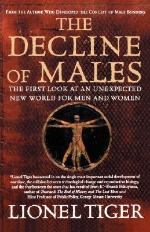
The Decline of Males: The First Look at an Unexpected New World for Men and Women
Dr. Lionel Tiger is anthropoloist at Rutgers University and is a leader in the growing field of Male Studies. In his book The Decline of Males, Tiger argues that the biggest reason men have been struggling in Western society is because they’ve “been alienated from the means of reproduction.” Using studies from his work in sociobiology and anthropology, Tiger lays out an argument explaining why the birth control pill has been one of the bigest contributors to the decline of men in the West.
Overall, the book is a very interesting read. There are some parts where his arguments and writing are hard to follow. I had to re-read his stuff a couple of times to get what he was trying to say. But it’s worthwhile to dig into it.
Listen to my podcast interview with Dr. Tiger.
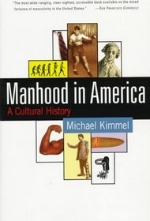
Manhood in America: A Cultural History
Want to know what manliness meant to men throughout American history? Then pick up a copy of this book. Sociology and Men’s Studies professor Michael Kimmel created the first and still best cultural history on masculinity in America. I’ve read this book several times and always find interesting tidbits each time I pick it up. The big take away from this book is that while there are some key features of manliness that never change, the meaning of masculinity in America has ebbed and flowed throughout history.
While I admire Kimmel’s thorough historical research, and most of the book is a solid read based on that research, my quibble with this book is the turn it takes at the end. The last couple of chapters dispense with the historical proof in favor of Kimmel’s criticism of American masculinity and his proposal for a new idea of manliness, which is basically to strip it of anything unique and for men to become more like women. He paints men’s rights advocates as whiners, men’s retreat participants as fruits, and those who look to the past as misogynists who can’t move on and get with the program.
Kimmel’s definitely a liberal feminist (he graduated from Vasser College), and he doesn’t like traditional notions of manliness. He’s often criticized for villainizing men and glorifying women.
Bottom line, read this book for the history and the awesome resources Kimmel has uncovered; skim over the pontificating.
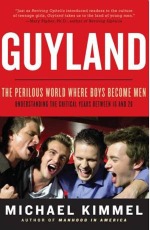
Guyland: The Perilous World Where Boys Become Men
This is another book written by feminist men’s studies writer, Michael Kimmel. In Guyland, Kimmel sets out to explain the sociological and cultural factors that have contributed to young men extending adolescence well into their twenties. Well, at least that’s what I thought the book would be about when I first picked it up. Instead Kimmel grinds his “women are good/men are bad” axe by painting a picture of young, white men as angry, lazy, misogynistic, sex predators. At the end of the book, Kimmel proposes a new take on masculinity for young men that is of course less masculine and more feminine.
There were a few interesting tidbits throughout Guyland, particularly how cultural and racial differences affect the behavior of young men.
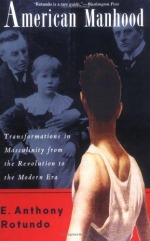
American Manhood: Transformations in Masculinity from the Revolution to the Modern Era
Like Michael Kimmel’s Manhood in America, Anthony Rotundo’s American Manhood gives a concise history of manliness in America. Unlike Kimmel, Rotundo is able to maintain a bit more objectivity and doesn’t bludegon the reader in the head with anti-male rhetoric.
While American Manhood does a good job describing the changing face of manliness throughout American history, Manhood in America is better researched and written.
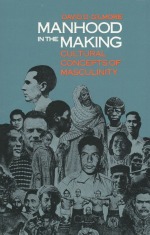
Manhood in the Making: Cultural Concepts of Masculinity
While many of books on this list focus on American or Western masculinity, Manhood in the Making is a cross-cultural study of manliness. Anthropologist David Gilmore analyzes the cultures of the world, especially tribal cultures, and finds universal notions of what manliness means within those societies.
This book is a bit more academic than many of the books here, but definitely a worthwhile read.
Style and Etiquette Books for Men
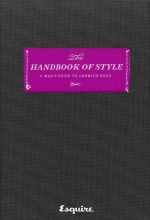
Esquire’s The Handbook of Style: A Man’s Guide to Looking Good
Esquire Magazine has been an authority on men’s style for over 70 years, so it’s only natural that they wrote a book on the subject. The Esquire Handbook of Style is crammed with useful information on how to be more dapper. If you read Esquire’s bi-annual style special, The Big Black Book, you’ll find the format and look of The Handbook of Style very similar. In fact, many of the sections in this book were taken directly from previous editions of The Big Black Book. And of course, the Handbook of Style has plenty of that cheeky, Esquire humor that millions of readers have grown to love, which makes the book an enjoyable read.
If you’re looking for some basic style advice for all aspects of your life that’s fun to read, pick up this book.
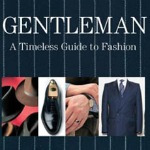
Gentleman: A Timeless Guide to Fashion
Bernhard Roetzel’s book, A Timeless Guide to Fashion, is a beautifully photographed tour of men’s style. The author is German and has a decidedly European sense of style. Consequently, the book focuses primarily on European men’s style and gives American style the short shrift. I found the photos highlighting different fabric types helpful for someone who used to be clueless about that sort of thing.
AoM’s style writer, Antonio Centeno, is a fan of this book. Check out his review here.
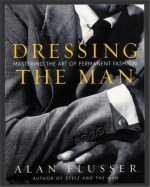
Dressing the Man: Mastering the Art of Permanent Fashion
American men’s style designer Alan Flusser penned this image heavy book on the timeless elements of men’s style. If you’re looking to build a wardrobe that will still look good 20 years from now, get this book. Flusser explains how to mix patterns and fabrics, what kinds of ties to wear with different kinds of shirt collars, what business casual actually means, and much, much more.
Of course, you can find a lot of information in Dressing the Man for free here on AoM thanks to our style writer, Antonio. But I’d at least check out this book from your library, if only to look at the pictures.
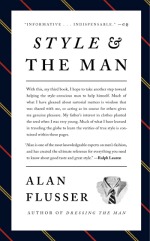
Style and the Man
Written by the same gentleman who brought you Dressing the Man, Style and the Man is a short treatise on the basics of classic men’s style. This book isn’t as image heavy as Dressing the Man. Instead of full colored photographs like there are in Dressing the Man, Style and the Man uses simple black and white illustrations. Personally, I prefer the nice pictures, probably because I have the brain of a pre-schooler. The big benefit Style and the Man has over Dressing the Man is price. Style and the Man is about $35 cheaper than Dressing the Man and you basically get the same information.
Check out Antonio Centeno’s review of this book on Amazon.
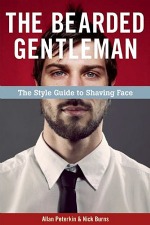
The Bearded Gentleman: The Style Guide to Shaving Face
Alan Peterkin wrote a cultural history of facial hair in 1,000 Beards. In this follow-up, Peterkin focuses less on the history of beards and more on how to grow and maintain one. You’ll find advice on choosing the best facial hair style for your face and head shape as well as info on creating the the best shave kit. Peterkin does a good job injecting humor throughout the book so it’s a fun read.
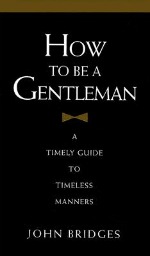
How to Be a Gentleman: A Timely Guide to Timeless Manners
John Bridges has created an empire teaching men how to be gentlemen. How to be A Gentleman is the first of many etiquette books Bridges has written for men. You’ll find advice on all aspects of life from what to wear on special occasions to the ins and outs of proper cellphone etiquette. It’s a short book and would make a great gift for a young man about to head off to college or who just landed his first job.
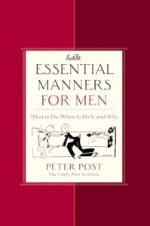
Essential Manners for Men: What to Do, When to Do It, and Why
Peter Post is the great-grandson of the matriarch of manners, Emily Post and is a director at the Emily Post Institute. Basically this guy is an etiquette expert. He’s taken his experience growing up in the Post family along with his work teaching manners to business people all over the world to create a book on manners directed just at men. The book is divided into three sections: Everyday Life, Social Life, and On the Job.
What’s nice about Post is that he has a very common sense approach to etiquette. Many books espouse very rigid and often arbitrary rules. Essential Manners for Men encourages men to use common sense when it comes to good manners.
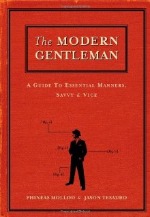
The Modern Gentleman: A Guide to Essential Manners, Savvy and Vice
This is another book that several AoM readers have suggested to me. The Modern Gentleman is co-authored by Phineas Mollod and Jason Tesauro. The book is broken into sections about gentlemanly knowledge, style, and manners.
The table of contents makes it look like this is a practical, no-nonsense book, but a few pages into it I realized these two gents wrote this book with tongue firmly placed in cheek; for example, they offer advice on how to hide and sip alcohol from a flask at work or when meeting your fiancee’s parents. There isn’t much useful info in the book and when they do offer some practical information, they present it in a way that makes it hard to follow. I also thought the writing was quite pompous and pretentious, so that it comes off as if they are trying too hard to sound sophisticated and smart. Some people will probably enjoy the flowery style, but personally, I’m a guy that likes his information presented in a straightforward manner.
Best piece of information in this book: How to Saber a Champagne Bottle.
Man Skills
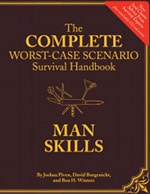
The Complete Worst-Case Scenario Survival Handbook: Man Skills
You’ve probably thumbed through a copy of one of the Worst Case Scenario Survival Handbooks before. The Man Skills edition is a massive compendium of their best survival skills all in a single book. In this squat little volume you’ll find out how to escape a ferocious dog, how to deal with bad breath on a date, and how to spot a card cheat. Great book to have near the toilet.
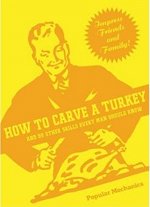
How to Carve a Turkey: And 99 Other Skills Every Man Should Know (Popular Mechanics)
A few years ago Popular Mechanics published an article highlighting 100 skills every man should know. They’ve taken that list, added more detail in their explanations, and turned it into an easy to read book.
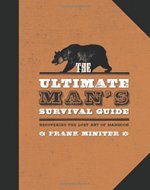
The Ultimate Man’s Survival Guide: Rediscovering the Lost Art of Manhood
This is a fun book filled with important man skills like shooting a shotgun and surviving in the wild. I love the way it looks, too. It has a handsome, vintage manly feel.
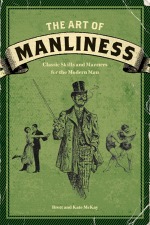
The Art of Manliness: Classic Skills and Manners for the Modern Man
What man book list would be complete without this manly classic? It’s the Art of Manliness in analog format. Published in 2009, The Art of Manliness: Classic Skills and Manners for the Modern Man is a guide book to help any man rediscover the lost arts of manliness. The book could really fit in several of these categories; within its pages you’ll learn how to get fitted for a suit, how to start a fire without matches, and how to cultivate solid friendships with men and romantic relationships with women.
Tags: Books


